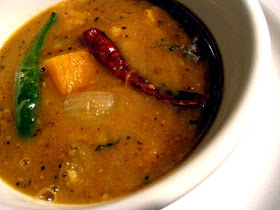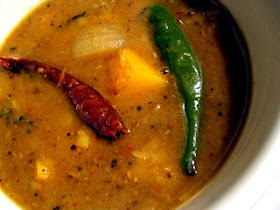Served as part of almost every meal, every south Indian kitchen has its own staple sambar recipes to hand down to family and friends. At the same time, these thick, fiery and aromatic vegetable stews cooked with dals and tamarind remain an exotic and virtually unknown dish in the rest of the world, even in Indian restaurants. Once you try an authentic sambar, however, these extraordinary delights will never return to anonymity even as they retain the warm and exotic appeal that stirs images of caravans shambling under scorching suns down the ancient spice routes of the subcontinent.
Much simpler to make than the long list of ingredients would suggest, this colorful and seasonal butternut squash sambar has an inviting fragrance and a satisfying depth of delightful flavors. Toor dal, or split pigeon peas, are easily found at any Indian grocery, along with tamarind pulp, asafetida, and any of the other ingredients listed below.
 Butternut Squash Sambar Butternut Squash Sambar |
Recipe by Lisa Turner
Cuisine: Indian
Published on January 26, 2009
Sweet, spicy and aromatic south Indian pigeon pea and tamarind curry with butternut squash
Preparation: 20 minutes
Cooking time: 50 to 60 minutes
 Print this recipe Print this recipe
Sambar:
- 1 cup dried toor dal (split pigeon peas)
- 1/4 teaspoon turmeric
- 1 tablespoon olive oil
- 2 teaspoons tamarind pulp
- 1/2 tablespoon butter
- 1/8 teaspoon asafetida
- 2 medium onions, cut lengthwise into narrow wedges
- 3 to 4 green chilies, slit lengthwise on one side
- small handful fresh of dried curry leaves
- 1 medium butternut or other winter squash, seeded and cubed
- 1 medium tomato, cut lengthwise into wedges
- 1/2 teaspoon rapadura or cane sugar
- 1 teaspoon sea salt, or to taste
Sambar spice blend:
- 1/2 cup dried grated unsweetened coconut
- 2 teaspoons urad dal
- 3 teaspoons coriander seeds
- 2 teaspoons cumin seeds
- 1/4 teaspoon fenugreek seeds
- 4 dried whole red chilies
Tempering (tadka):
- 1 teaspoon olive oil
- 1 teaspoon brown mustard seeds
- 1/8 teaspoon asafetida
- 3 dried whole red chilies
- small handful of fresh or dried curry leaves
Instructions:
Thoroughly rinse the toor dal under running water and soak for 4 to 6 hours covered in a few inches of cold water. Drain and rinse, then add to a medium saucepan with 2 cups of fresh water with the turmeric and half tablespoon of the olive oil. Bring to a boil, then reduce the heat to low, cover, and simmer for 20 to 30 minutes or until the dal is very soft. Remove from heat and gently mash with a potato masher. Set aside. Meanwhile, dry roast the spice blend ingredients in a stainless steel frying pan or saucepan over medium-low heat, stirring or shaking occasionally, until the coconut has turned a light brown. Grind to a very fine powder in a spice mill, coffee grinder or food processor. Set aside. Pour hot water over the tamarind pulp in a bowl and let sit. Heat the remaining olive oil and the butter in a large saucepan over medium heat. Sprinkle in the asafetida, and immediately add the onion, green chilies and curry leaves. Sauté for 3 to 4 minutes or until the onions start to turn translucent. Add the squash and tomato, and add just enough water to cover the vegetables. Cover the pan and cook until the squash is tender but keeps its shape, about 20 minutes depending on the variety of squash and the size of the pieces. Remove the tamarind pulp and strain the juice through a fine-meshed strainer set over the saucepan. Cover and let simmer for another 5 minutes. Now stir in the spice blend and the sugar and let simmer for another 2 or 3 minutes. Stir in the mashed toor dal and remove from heat. For the tempering, heat the olive oil in a small stainless steel frying pan or saucepan over medium heat. When the oil is hot, toss in the mustard seeds. As soon as they begin spluttering and popping, usually a few seconds, add the asafetida, dried red chilies and curry leaves. Stir for a minute to let the leaves wilt and the chilies brown a little, then pour over the sambar. Cover and let sit a few minutes to let the flavors mingle. Serve hot in bowls with rice or fresh bread on the side.
Makes 6 to 8 servings |

 Butternut Squash Sambar
Butternut Squash Sambar Print this recipe
Print this recipe


lisa this is wonderfully innovative! What a fantastic use of pumpkin here!
ReplyDeleteyour sambhar looks delicious! I normally take the short cut to make mine by using store bought sambhar masala!!
ReplyDeleteSambar's made 1-2 times a week in my home.:)
ReplyDeleteI remember making Padma's sambar... it was good.
This sounds fabulous. Perfect as a started to a meal.
ReplyDeletethank you for the wonderful squash recipe. it's the season for squash!
ReplyDeleteLisa,
ReplyDeleteCan you suggest a sub (if there even is one) for urad daal? I have everything else in hand and it may be a few weeks until I can journey to the Indian grocery.
Thanks!
~Vicci
Hi Vicci;
ReplyDeleteYou could substitute some lentils for the ural dal I should think, or even leave out the urad dal, though I think they do add a nice touch to the dish.
Lentils it is, then, and thanks for such a quick response! :)
ReplyDelete~Vicci
Another delicious and healthy dish. I must try this but unfortunately with lentils and no urad dal here.
ReplyDeleteSounds yummy to me. First time to ur blog, you have lots of good recipes...
ReplyDeleteI really need to get busy and make a sambar.
ReplyDeleteCan't wait to try your sambar thanks for sharing.
ReplyDeleteYou have a real way with spices Lisa. Dish after gorgeous dish.
ReplyDeleteLovely Lisa,never tried butternut squash in a sambar.Lovely and wonderfully spicy.
ReplyDeleteThanks for the lovely entry!
ReplyDeleteSambar looks perfect, Lisa...
ReplyDeletethat looks perfect. I often cook it.
ReplyDeleteLisa,
ReplyDeleteYour sambhar looks great!
You should invest in a pressure cooker (available at sears ~ 30 bucks), toor dhaal cooks in like 15 minutes and no soaking.
My husband is a die hard fan of sambar. he needs variety in sambars too. and i searched a long for getting this one. sounds great. i will definitely try it. and he likes tomato more so will add in that. thanks for sharing this recipe.
ReplyDeleteTruly tons of terrific info!
ReplyDeleteI do not even know how I ended up here, but I thought this post was great.
ReplyDeleteI don't know who you are but definitely you are going to a famous blogger if you are not already ;) Cheers!